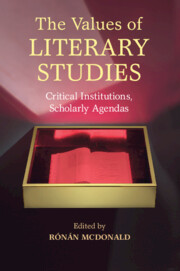Book contents
- Frontmatter
- Contents
- Notes on Contributors
- Acknowledgments
- Introduction
- 1 The Value of Criticism and the Project of Modernism
- 2 Caprice: Individual Subjectivity in Literary Criticism
- 3 The Phenomenology of Literary Valuation
- 4 Literature Is History: Aesthetic Time and the Ethics of Literary Will
- 5 Dead on Arrival: Time and the Value of Old Books
- 6 The Price of Value
- 7 To Shelter the Nothing That Happens
- 8 When Literary Criticism Mattered
- 9 Literature among the Objects of Modernist Criticism: Value, Medium, Genre
- 10 “Vale!” : Psychoanalysis, Value, and Literature
- 11 Afterlives of Comparison: Literature, Equivalence, Value
- 12 Feminism, Gender, and the Literary Commons
- 13 The Value of World Making in Global Literary Studies
- 14 Multiple Versions and Fictional Minds: Manuscript Research, Digital Editing, and Enactive Cognition in Literary Studies
- 15 After Suspicion: Surface, Method, Value
- 16 Literary Experience and the Value of Criticism
- Index
2 - Caprice: Individual Subjectivity in Literary Criticism
Published online by Cambridge University Press: 05 November 2015
- Frontmatter
- Contents
- Notes on Contributors
- Acknowledgments
- Introduction
- 1 The Value of Criticism and the Project of Modernism
- 2 Caprice: Individual Subjectivity in Literary Criticism
- 3 The Phenomenology of Literary Valuation
- 4 Literature Is History: Aesthetic Time and the Ethics of Literary Will
- 5 Dead on Arrival: Time and the Value of Old Books
- 6 The Price of Value
- 7 To Shelter the Nothing That Happens
- 8 When Literary Criticism Mattered
- 9 Literature among the Objects of Modernist Criticism: Value, Medium, Genre
- 10 “Vale!” : Psychoanalysis, Value, and Literature
- 11 Afterlives of Comparison: Literature, Equivalence, Value
- 12 Feminism, Gender, and the Literary Commons
- 13 The Value of World Making in Global Literary Studies
- 14 Multiple Versions and Fictional Minds: Manuscript Research, Digital Editing, and Enactive Cognition in Literary Studies
- 15 After Suspicion: Surface, Method, Value
- 16 Literary Experience and the Value of Criticism
- Index
Summary
“‘For poetry makes nothing happen’ is a phrase I would rather have avoided,” Geoffrey Hill remarks wryly, in the closing essay of his Collected Critical Writings. It is territory he has been in before. A 1999 essay, “Language, Suffering, and Silence,” contained an extended rebuke to Auden, primarily focused on what follows from that famous negation:
poetry makes nothing happen: it survives
In the valley of its making where executives
Would never want to tamper, …
(“In Memory of W. B. Yeats,” 1939)This “is an error,” Hill judged then: “It trivializes not only the activities of the world of commerce and commodity, which is a power to be reckoned with … but also the various ways in which the overreachings and shortcomings of business might be met with justice… Auden perhaps meant to say that the achieved work of art is its own sufficient act of witness … but I think there are more competent ways of putting it.”
The later Hill is less ex cathedra and (in keeping with a wider shift in his critical and poetic style in recent years) more willing to ironize his own authority, though he does not rescind the content of the judgment. In Auden's place, Hill implies, he should have desired and striven for a more serious claim on behalf of poetry; yet here he is, running up against words so attitudinally decided in their refusal to accord poetry power in the world that their very decision has tended to skew the terms of advocacy for poetry thereafter. “Poetry makes nothing happen” has a currency second only to “art for art's sake” in modern anti-instrumentalist accounts of literary value; unlike “art for art's sake” it does not obviously open the door to alternative talk of aesthetic autonomy. The problem, for Hill, is that, in brushing aside any assertion of poetry's effects in the world, Auden wrong-foots any subsequent writer who would make a more ethically serious claim to nonseriousness: “How can I say,” Hill goes on, “that poetry is, in all the terms one may want to bring to it, unserious, and yet repudiate Auden on the grounds of insufficient seriousness?” (568).
- Type
- Chapter
- Information
- The Values of Literary StudiesCritical Institutions, Scholarly Agendas, pp. 27 - 43Publisher: Cambridge University PressPrint publication year: 2015



